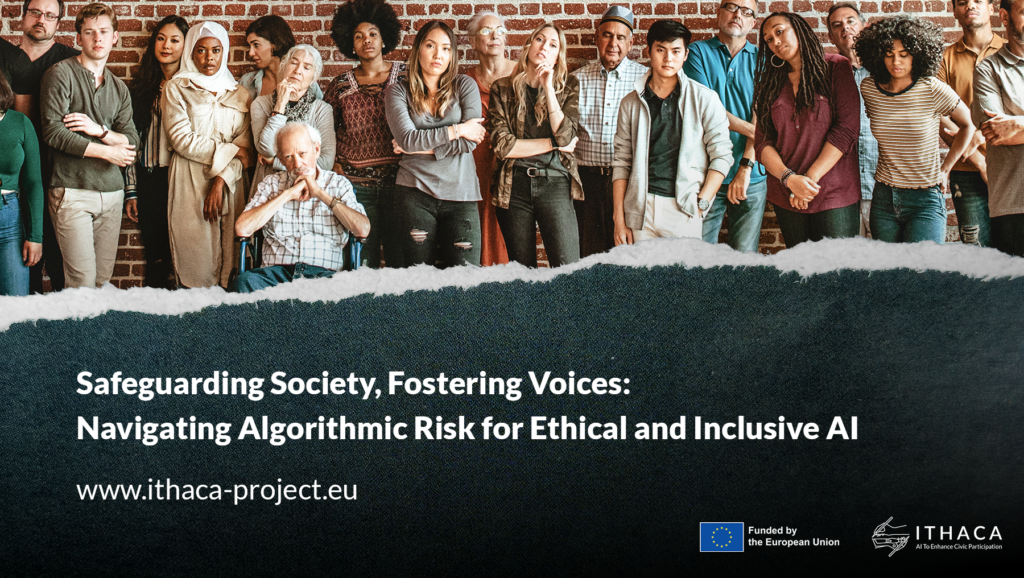In the realm of digital civic engagement, algorithmic systems wield significant influence. However, behind their functionality lies a complex landscape of ethical considerations and societal impacts. Algorithmic Impact Assessments (AIAs) emerge as crucial tools for promoting accountability and ethical practices. Despite challenges such as biases and transparency, embracing responsible AI design presents opportunities to shape a future where technology serves civic needs ethically. Join the ITHACA initiative in unravelling these complexities and charting a path toward algorithmic accountability.

In the pursuit of fostering more inclusive and accountable civic engagement in the digital age, we conducted a series of participatory workshops in Martin (Slovakia) and Brasov (Romania) as part of the AI Citizen Juries initiative. These workshops aimed to engage with citizens and delve into their experiences, concerns, and aspirations regarding online civic activities.
METHODOLOGY
Two on-site participatory workshops were implemented in the cities of Martin (Slovakia) and Brasov (Romania) to engage with the AI Citizen Juries established in the course of Work Package 2 (WP2). The workshop implementation methodology was adjusted based on the outcomes of the on-site Introductory workshops, with a total duration of 3 hours. Informative sessions, group discussions, and individual activities were conducted, covering topics such as human and algorithmic bias, discrimination, ethics, and fundamental rights.
OUTCOMES of Participatory Workshop in Brasov
The vast majority (90%) of the Brasov Citizen Jury participants perceived some negative impact because of their active involvement in public and/or online discussions or debates. This negative impact was linked to various factors, including feelings of disappointment among minority groups, frustration due to ignored initiatives, and discrimination in participatory processes. Discriminatory behaviour was reported across different aspects of daily life, resulting in fear and marginalization among socially vulnerable groups.
Despite the high prevalence of discriminatory experiences, only 30 % of the participants were aware of their rights regarding discriminatory behaviour. Many participants cited barriers such as lack of knowledge and fear of repercussions for not acting against discrimination. However, those who did act mainly resorted to formal complaints and legal procedures.
The main types of online civic activities participants engaged in included participatory budgeting, public debates, online petitions, and discussions on various social issues. Participants stressed the importance of identifying potential harms and discrimination in online civic activities to safeguard themselves, highlighting the need for continuous information, transparent platforms, and user control mechanisms.
OUTCOMES of Participatory Workshop in Martin
Similarly, the vast majority (89 %) of the participants in the Citizen Jury in Martin perceived negative impacts when actively engaged in public and/or online discussions or debates. Discriminatory behaviours were reported in various contexts, both online and in-person, including social networks, workplaces, and healthcare settings.
While 63 % of the participants were aware of their rights regarding discriminatory behaviour, others remained unsure or unaware. Despite experiencing discrimination, only 58 % of the participants acted, with barriers such as fear of consequences and uncertainty hindering proactive responses.
Participants in Martin primarily engaged in online discussions on social topics and initiatives for family well-being. They emphasized the importance of identifying and addressing potential harms and discrimination in online civic activities, highlighting the need for education, support mechanisms, and user oversight.
CHALLENGES AND OPPORTUNITIES
These findings underscore the urgent need for robust mechanisms to safeguard against bias, discrimination, and harm in digital civic engagement. By prioritizing education, transparency, and user empowerment, ITHACA stakeholders can work towards building more inclusive and ethical digital platforms that foster meaningful civic participation for all.
Education and information emerged as critical enablers for detecting and addressing harm in online civic engagement. Participants emphasized the importance of clear guidelines, transparent platforms, and accessible support mechanisms to enhance trust and accountability in digital spaces. Detailed information about platform management, updates, and data usage, along with tools for reporting problems, were identified as key factors in promoting safer online participation.

Funded by the European Union. Views and opinions expressed are however those of the author(s) only and do not necessarily reflect those of the European Union or the Europe Research Executive Agency. Neither the European Union nor the granting authority can be held responsible for them.